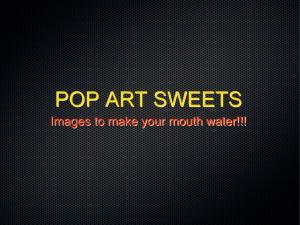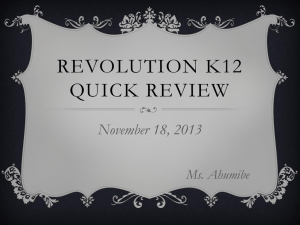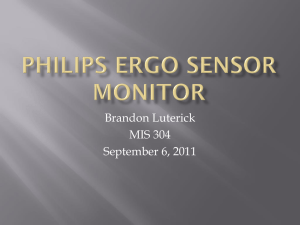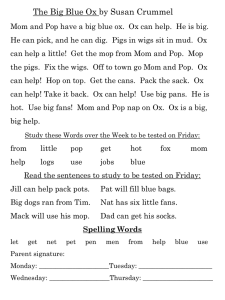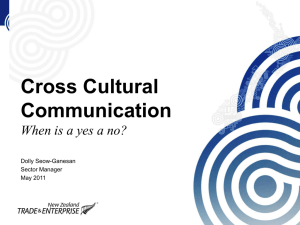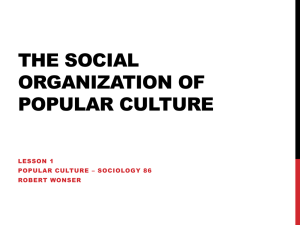Popular Education: Curriculum Development Basics
advertisement
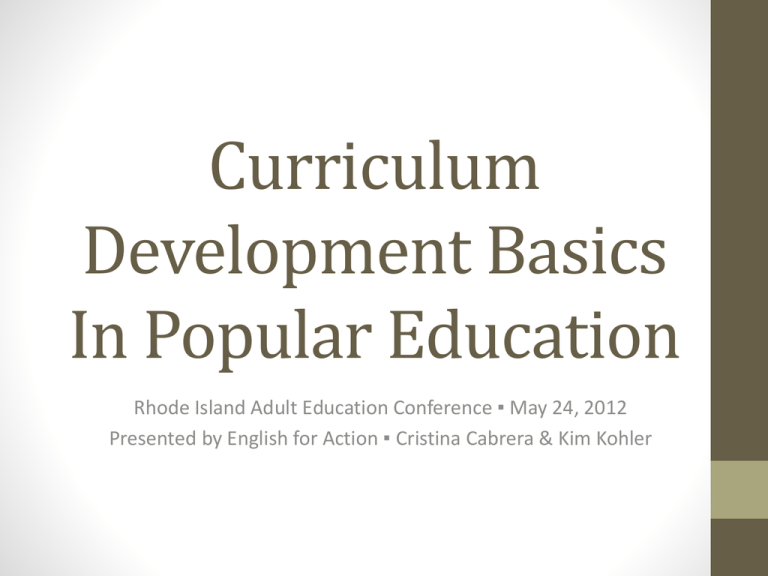
Curriculum Development Basics In Popular Education Rhode Island Adult Education Conference ▪ May 24, 2012 Presented by English for Action ▪ Cristina Cabrera & Kim Kohler Desired Outcomes • A basic understanding of popular education theory and Freirian methodology • A basic understanding of how to translate Pop Ed theory into the classroom and into our curriculums • Hands-on practice of some Pop Ed tools Agenda • • • • • Welcome & Introductions English for Action (EFA) Paulo Freire Paulo Freire’s Six Pop Ed Principles Paulo Freire’s Methodology: Problem Posing & Critical Pedagogy • Integrating Problem Posing with Language Learning: • Curriculum Development • Pop Ed Tools • Plus/ Delta • Gallery Walk English for Action • Since 1999 • Located in Olneyville, Providence’s poorest neighborhood • Working with immigrant families, mostly Latino • Applying Paulo Freire’s Popular Education Methodology in all programs and throughout the organization • Basic Programs: Adult Education (ESOL, ABE, ASE); Arts Literacy for Youth; Native Language Literacy; Leadership Development; Women’s Empowerment; Digital Literacy English for Action: Mission Language Learning Community Building Leadership Development Participatory Approach Social Change Paulo Freire • Brazilian educator and theorist of critical pedagogy (1929-1997) • Professor of Philosophy of Education at the University of Recife, Brazil (one of the poorest regions in the world) • Started an Adult Education Program based on arts and language literacy so people from ghettos and rural areas could learn how to read and write through the arts • In the 1960s, only literate people could vote in Brazil • Freire’s Adult Ed Program expanded nationwide in 1963 Freire’s Critical Pedagogy Emphasis on Developing a Critical Consciousness • Reading the WORD involves reading the WORLD and having a “structural perception” of reality • Critical thinking involves recognizing and researching the assumptions of power and hegemony that undergird our thoughts and actions (Stephen Brookfield, Professor of Adult Education, University of St. Thomas). Six Freirian Principles • Education is NOT neutral • Content comes from the Participants • Dialogue • Problem-Posing Education • Reflection/Action • Transformation Comparing to Freirian Principles • Which of these things do you already do? • Which would you like to do? • Which do you think are ridiculous, impossible, or not useful? • What do you already do that is not listed in the flyer? Learning A Language in Context (through Problem Posing) •TO SEE: to identify a community issue that will become the generative theme •TO ANALYZE: to ask problem posing questions and to reflect on the root causes & manifestations of the issue •TO ACT: to act to change the situation Q& A • What is Participatory Approach? • What is a Learner Centered Curriculum? • What is the Mutual Learning Process? • What is Problem Posing? • What is Critical Pedagogy? • What is Transformative Education? • What is Popular Education? Developing Pop Ed Curriculum: Integrating Problem Posing with Language Learning Prob.Posing Living Curriculum To see Finding Learner Themes & Subthemes TBD To Analyze Exploring a Code TBD Analysis & Discussion TBD Synthesis & Action TBD To Act Language Learning Pop Ed Tools • • • • Collective drawings Brainstorming Wheel Problem Tree Codes • • • • • • Pop Scenarios Forum Theatre Socio Drama Theatre of the Oppressed Debates Role Plays Developing a Pop Ed Curriculum: Integrating Problem Posing with Language Learning Problem Posing Method TO SEE The Living Curriculum Stage 1: Finding Learner Themes & Subthemes Language Learning Skills Development Identifying Naming (a Problem) Recognizing (the problem and my role in it) Brainstorming Listening (to others) How to Ask Questions Community Building (5Ws, open-ended questions, Gathering/Collecting Info yes/no answers etc) Participating Exploring How to Interview People Representing (speed-dating, surveys, human Illustrating bingos etc) Listing Reported Speech Categorizing Arranging Getting to Know our Personal and Advocacy Community Needs Persuasive Speech Negotiating Future Tenses Tolerance Dreams Communication Skills Goal Setting Voting/ Decision-Making SMART goals Formulating hypothesis/solutions Wish Clauses Looking into Cause and If Clauses (Conditionals) Effect Modals (could, would, should) Present and Past Tenses Introductions: How to Introduce Yourself/Getting to Know Each Other Grammar in Context Pop Ed Tools Problem Tree Vision Tree Sick Tree Collective Drawings Brainstorming Wheel Google Wonder Wheel Mind Mapping Pop Ed Curriculum cont’d. Problem Posing Method TO ANALYZE The Living Curriculum Stage 2: Exploring A Code Language Learning Vocabulary Expressions All 4 Language Skills LEA (Learning Experience Approach) TPR (total physical response) Story Telling & Story Writing (sharing our experiences related to the problem) Journaling: Self-Reflection Skills Development Interrogating Questioning Inquiring Problem Posing Questions Observing Reflecting De-Coding De-constructing Comprehending Identifying patterns Telling & Re-telling Viewing problem from different angles Empathy Identifying yourself with the other Pop Ed Tools Texts Photos Dictations News Articles Essays Cartoons Painting Pay Stub/bills Pop Ed Curriculum cont’d. Problem Posing Method TO ANALYZE The Living Curriculum Stage 3: Sharing and Analysis Language Learning Grammar in Context based on Selected Theme and Subthemes Skills Development Deepening understanding Critical Thinking Exploring Comparing and Contrasting Delving into Context Clues Inference Connecting the Dots Reflecting Analyzing Critiquing Conceptualizing Contextualizing Research Communication Skills Develop supported arguments Advocacy Persuasive skills Negotiating skills Pop Ed Tools Socio Dramas Pop Scenarios Debates Class Discussions Peer Interviews Forum Theatre Theatre of the Oppressed Role Play Skits TPRS Surveys Treasure Hunt Pop Ed Curriculum cont’d. Problem Posing Method TO ACT The Living Curriculum Stage 4: Synthesis and Action Evaluation Charts Exhibits Production of Songs, Video Clips, Art, Blog Writing a Petition, developing a bill of law, leading a panel, writing an Op-ed, meeting with a government official etc.jhgj Language Learning Skills Development Grammar in Context based on Selected Theme and Subthemes Summarizing Skills Drawing Conclusions Synthesis Strategizing Problem-solving Decision-making Assessment Evaluation Reflection Presentation Skills Demonstrating Explaining Application Seeing the big picture Reading the world by reading the word Action skills Production Project Implementation Project Management Skills Leadership Skills Community Building Skills Pop Ed Tools Action Plans Group Writing LEA Problem Trees Community Theatre Project Charter Codes Codes Codes • Problem Posing Questions What do you see? What is happening? Is there a problem? Have you or someone you know had a similar problem? What do you think are the root causes of this issue? What is the role of women in your country? In the US? What is the role of men in your country and in the US? How do you feel about these roles? How do these roles impact your life at home and at work? The “Banking Model” • Learners are empty vessels devoid of any knowledge and the educators job is to fill the empty accounts by making deposits of knowledge. The learners thus become passive recipients of prepackaged and predetermined curriculum content. The classroom processes are disempowering because they rehearse students in for submissive roles in the social order…this kind of curriculum is domesticating in that it tames people into uncritical acceptance of things as they are, discouraging them from actively challenging the forces that keep them marginalized.” Making Meaning Making Change p. 16 Popular Education Go with the people. Live with them. Learn from them. Love them. Start with what they know. Build with what they have. But of the best leaders When the job is done, the task accomplished, The people will say, “We have done this ourselves.” Lao Tsu, China, 700 BC
